- 1 2 Nutt, p. 173.
- ↑ Nutt, pp. 171–172.
- 1 2 Worcester Bank and Trust, p. 25.
- ↑ Worcester Bank and Trust, p. 17.
- 1 2 3 4 Brauer, p. 678.
- 1 2 3 Formisano, p. 82.
- ↑ Washburn, p. 56.
- ↑ Washburn, p. 51.
- ↑ "Book of Members, 1780–2010: Chapter L" (PDF). American Academy of Arts and Sciences. Retrieved September 9, 2016.
- ↑ Formisano, p. 83.
- ↑ Darling, pp. 47, 58, 74–75, 93, 104.
- 1 2 Formisano, p. 193.
- 1 2 Formisano, p. 195.
- ↑ Washburn, p. 60.
- ↑ Dalzell, p. 87.
- ↑ Formisano, p. 192.
- ↑ Formisano, p. 194.
- ↑ Johnson, pp. 344–348.
- ↑ Grob, p. 98.
- ↑ Lewis, pp. 68–77.
- ↑ Washburn, p. 64.
- ↑ Frothingham, p. 139.
- ↑ Chase, p. 135.
- ↑ Chase, pp. 136–140.
- ↑ Gilman, D. C.; Peck, H. T.; Colby, F. M., eds. (1905). . New International Encyclopedia (1st ed.). New York: Dodd, Mead.
- ↑ Warren, p. 397.
- ↑ Pennsylvania Biographical Dictionary, pp. 109–111.
- ↑ Urwin, pp. 138–139.
- ↑ "THE 1998 ELECTIONS: THE NATION -- GOVERNORS; George W. Bush Is Re-elected in Texas; His Brother Jeb Is Victorious in Florida". New York Times. November 4, 1998.
- ↑ Washburn, p. 69.
- ↑ Zboray and Zboray, p. 58.
- 1 2 Brauer, Kinsley, p. 679.
- 1 2 Moynihan, p. 138.
- ↑ "MACRIS Record for Lincoln Estate-Elm Park Historic District". Commonwealth of Massachusetts. Retrieved March 7, 2013.
- ↑ Moynihan, p. 149.
- ↑ Moynihan, pp. 150–151.
- ↑ Moynihan, p. 152.
- ↑ Moynihan, p. 153.
- ↑ American Antiquarian Society Members Directory
- ↑ Worcester Bank and Trust, p. 26.
- ↑ "Abraham Lincoln Family Tree". YouTube . January 20, 2023.
- ↑ The National Cyclopaedia of American Biography. Vol. I. New York, N.Y.: James T. White & Company. 1898. pp. 114–115 – via Google Books.
- ↑ United States Congress. "Levi Lincoln Jr. (id: L000315)". Biographical Directory of the United States Congress .
- ↑ See e.g. Rice, pp. 46, 55, and others.
- ↑ "MACRIS record for Gov. Levi Lincoln House". Commonwealth of Massachusetts. Retrieved March 7, 2013.
- ↑ "The Stylish Stamp of the Greek Revival". Old Sturbridge Village. Archived from the original on April 15, 2013. Retrieved March 7, 2013.
Related Research Articles
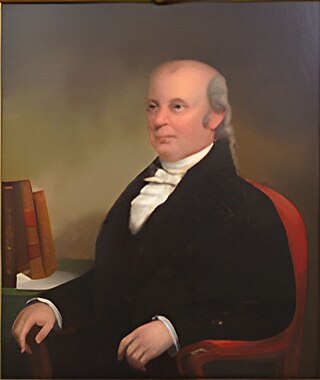
Levi Lincoln Sr. was an American revolutionary, lawyer, and statesman from Massachusetts. A Democratic-Republican, he most notably served as Thomas Jefferson's first attorney general, and played a significant role in the events that led to the celebrated Marbury v. Madison court case. He served two terms as the lieutenant governor of Massachusetts, acting as governor for the remainder of Governor James Sullivan's term after his death in December 1808. Lincoln was unsuccessful in his bid to be elected governor in his own right in 1809.

William Eustis was an early American physician, politician, and statesman from Massachusetts. Trained in medicine, he served as a military surgeon during the American Revolutionary War, notably at the Battle of Bunker Hill. He resumed medical practice after the war, but soon entered politics.

Marcus Morton was an American lawyer, jurist, and politician from Taunton, Massachusetts. He served two terms as the governor of Massachusetts and several months as Acting Governor following the death in 1825 of William Eustis. He served for 15 years as an associate justice of the Massachusetts Supreme Judicial Court, all the while running unsuccessfully as a Democrat for governor. He finally won the 1839 election, acquiring exactly the number of votes required for a majority win over Edward Everett. After losing the 1840 and 1841 elections, he was elected in a narrow victory in 1842.

Samuel Turell Armstrong was a U.S. political figure. Born in 1784 in Dorchester, Massachusetts, he was a printer and bookseller in Boston, specializing in religious materials. Among his works were an early stereotype edition of Scott's Family Bible, which was very popular, and The Panoplist, a religious magazine devoted to missionary interests.

Caleb Strong Jr. was an American lawyer, politician, and Founding Father who served as the sixth and tenth governor of Massachusetts between 1800 and 1807, and again from 1812 until 1816. He assisted in drafting the Massachusetts State Constitution in 1779 and served as a state senator and on the Massachusetts Governor's Council before being elected to the inaugural United States Senate. A leading member of the Massachusetts Federalist Party, his political success delayed the decline of the Federalists in Massachusetts.

James Sullivan was an American lawyer and politician in Massachusetts. He was an early associate justice of the Massachusetts Supreme Judicial Court, served as the state's attorney general for many years, and as governor of the state from 1807 until his death.

Thomas Talbot was an American textile mill owner and politician from Massachusetts, United States. Talbot ran a major textile business, involving chemical dyeworks and the weaving of fabric, in Billerica that was a major local employer. As a Republican, he served in the state legislature, on the Massachusetts Governor's Council, and as the 29th lieutenant governor before serving for one partial term as acting governor of Massachusetts, and later for one full term as the 31st governor.

John Davis was an American lawyer, businessman and politician from Massachusetts. He spent 25 years in public service, serving in both houses of the United States Congress and for three non-consecutive years as Governor of Massachusetts. Because of his reputation for personal integrity he was known as "Honest John" Davis.
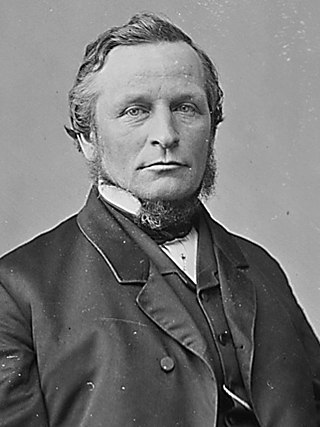
William Barrett Washburn was an American businessman and politician from Massachusetts. Washburn served several terms in the United States House of Representatives (1863–71) and as the 28th governor of Massachusetts from 1872 to 1874, when he won election to the United States Senate in a special election to succeed the recently deceased Charles Sumner. A moderate Republican, Washburn only partially supported the Radical Republican agenda during the American Civil War and the Reconstruction Era that followed.

Christopher Gore was a prominent Massachusetts lawyer, Federalist politician, and U.S. diplomat. Born into a family divided by the American Revolution, Gore sided with the victorious Patriots, established a successful law practice in Boston, and built a fortune by purchasing Revolutionary government debts at a discount and receiving full value for them from the government.
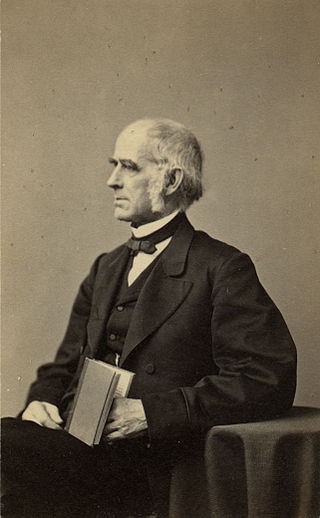
Emory Washburn was an American lawyer, politician, and historian. He was Governor of Massachusetts for one term, and served for many years on the faculty of Harvard Law School. His history of the early years of the Massachusetts Supreme Judicial Court is considered a foundational work on the subject.

Moses Gill was an American merchant and politician who served as the acting governor of Massachusetts from 1799 to 1800, when he died in office, the only acting governor to do so. A successful businessman, he became one of the most prominent colonists in Princeton, Massachusetts, entering politics shortly before the American Revolutionary War. He served on the Massachusetts Provincial Congress's executive committee until the state adopted its constitution in 1780, after which he continued to serve on the state's Governor's Council.
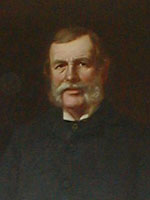
Henry Joseph Gardner was the 23rd Governor of Massachusetts, serving from 1855 to 1858. Gardner, a Know Nothing, was elected governor as part of the sweeping victory of Know Nothing candidates in the Massachusetts elections of 1854.
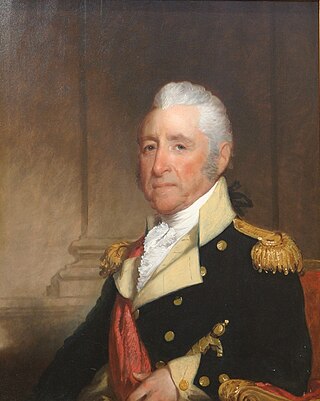
John Brooks was an American doctor, military officer, and politician from Massachusetts. He served as the 11th Governor of Massachusetts from 1816 to 1823, and was one of the last Federalist officials elected in the United States.

Alexander Hamilton Bullock was an American lawyer, politician, and businessman from Massachusetts. First a Whig and then a Republican, he served three terms (1866–69) as the 26th Governor of Massachusetts. He was actively opposed to the expansion of slavery before the American Civil War, playing a major role in the New England Emigrant Aid Society, founded in 1855 to settle the Kansas Territory with abolitionists. He was for many years involved in the insurance industry in Worcester, where he also served one term as mayor.

The 1839 Massachusetts gubernatorial election was a tightly contested race won by Marcus Morton. Under Massachusetts law at the time, a majority of the votes cast was required to win, and Morton received exactly half the votes cast. Despite the presence of some irregularities, incumbent Whig governor Edward Everett refused to contest the results once a legislative committee dominated by his party accepted a report giving Morton 51,034 votes out of 102,066 cast.

Robert Morris Washburn (1868–1946) was an American politician and writer who served in the Massachusetts General Court and wrote a newspaper column and a number of biographies on Massachusetts politicians, including Calvin Coolidge.

The 1854 Massachusetts gubernatorial election was held on November 15. American Party candidate Henry J. Gardner was elected to his first term as governor, defeating incumbent Whig governor Emory Washburn.

The 1874 Massachusetts gubernatorial election was held on November 3, 1874. Republican acting Governor Thomas Talbot, who took office after the resignation of William B. Washburn, was defeated by Democrat William Gaston, a former Mayor of Boston.

The second 1831 Massachusetts gubernatorial election was held on November 14.
References
- Brauer, Kinley (1999). "Lincoln, Levi". Dictionary of American National Biography. Vol. 13. New York: Oxford University Press. pp. 678–679. ISBN 9780195206357. OCLC 39182280.
- Chase, Frederick (1918). Lemuel Shaw: Chief Just of the Supreme Judicial Court of Massachusetts. Boston, MA: Houghton Mifflin. OCLC 41668851.
- Dalzell Jr, Robert (1987). Enterprising Elite: The Boston Associates and the World They Made. Cambridge, MA: Harvard University Press. ISBN 9780674257658. OCLC 15107890.
- Darling, Arthur (1925). Political Changes in Massachusetts, 1824–1848. New Haven, CT: Yale University Press. OCLC 1593840.
- Formisano, Ronald (1983). The Transformation of Political Culture: Massachusetts Parties, 1790s–1840s . New York: Oxford University Press. ISBN 9780195035094. OCLC 18429354.
- Frothingham, Paul Revere (1925). Edward Everett, Orator and Statesman. Boston: Houghton Mifflin Company. OCLC 1517736.
- Grob, Gerald (2009) [1973]. Mental Institutions in America : Social Policy to 1875. New Brunswick, NJ: Transaction. ISBN 9781412808507. OCLC 265650829.
- Johnson, John, ed. (2001). Historic US Court Cases, Volume 1 . New York: Taylor and Francis. ISBN 9780415937559. OCLC 24847153.
- Lewis, Orlando (1922). The Development of American Prisons and Prison Customs, 1776–1845. Albany, NY: Prison Association of New York. p. 68. OCLC 720621.
- Nutt, Charles (1919). History of Worcester and its People, Volume 1. New York: Lewis Historic Publishing Co. OCLC 3257562.
- Moynihan, Kenneth (2007). A History of Worcester. Charleston, SC: History Press. ISBN 9781596292345. OCLC 167764114.
- Pennsylvania Biographical Dictionary. St. Clair Shores, MI: Somerset Publishing. 1999. ISBN 9780403099504.
- Rice, Frank (1893). Dictionary of Worcester (Massachusetts) and its Vicinity. Worcester, MA: F.S. Blanchard. p. 55. OCLC 1163769.
- Urwin, Cathy (1991). Agenda for Reform: Winthrop Rockefeller as Governor of Arkansas, 1967–71. Fayetteville, AR: University of Arkansas Press. ISBN 9781557282002. OCLC 22488996.
- Warren, Kenneth, ed. (2008). Encyclopedia of U.S. Campaigns Elections, and Electoral Behavior, Volume 1. Los Angeles, CA: Sage. ISBN 9781412954891. OCLC 470808938.
- Washburn, Emory (1870). "Memorial of Hon. Levi Lincoln". Proceedings of the Massachusetts Historical Society. 11: 47–83. JSTOR 25079399.
- Worcester Bank and Trust Co (1920). Forty Immortals of Worcester and its County. Boston: Walton Advertising and Printing Co. OCLC 2961541.
- Zboray, Ronald and Mary (2010). Voices without Votes: Women and Politics in Antebellum New England. Durham, NH: University Press of New England. ISBN 9781584658672. OCLC 464597276.
External links
Levi Lincoln Jr. | |
|---|---|
 | |
| 13th Governor of Massachusetts | |
| In office May 26, 1825 –January 9, 1834 |



